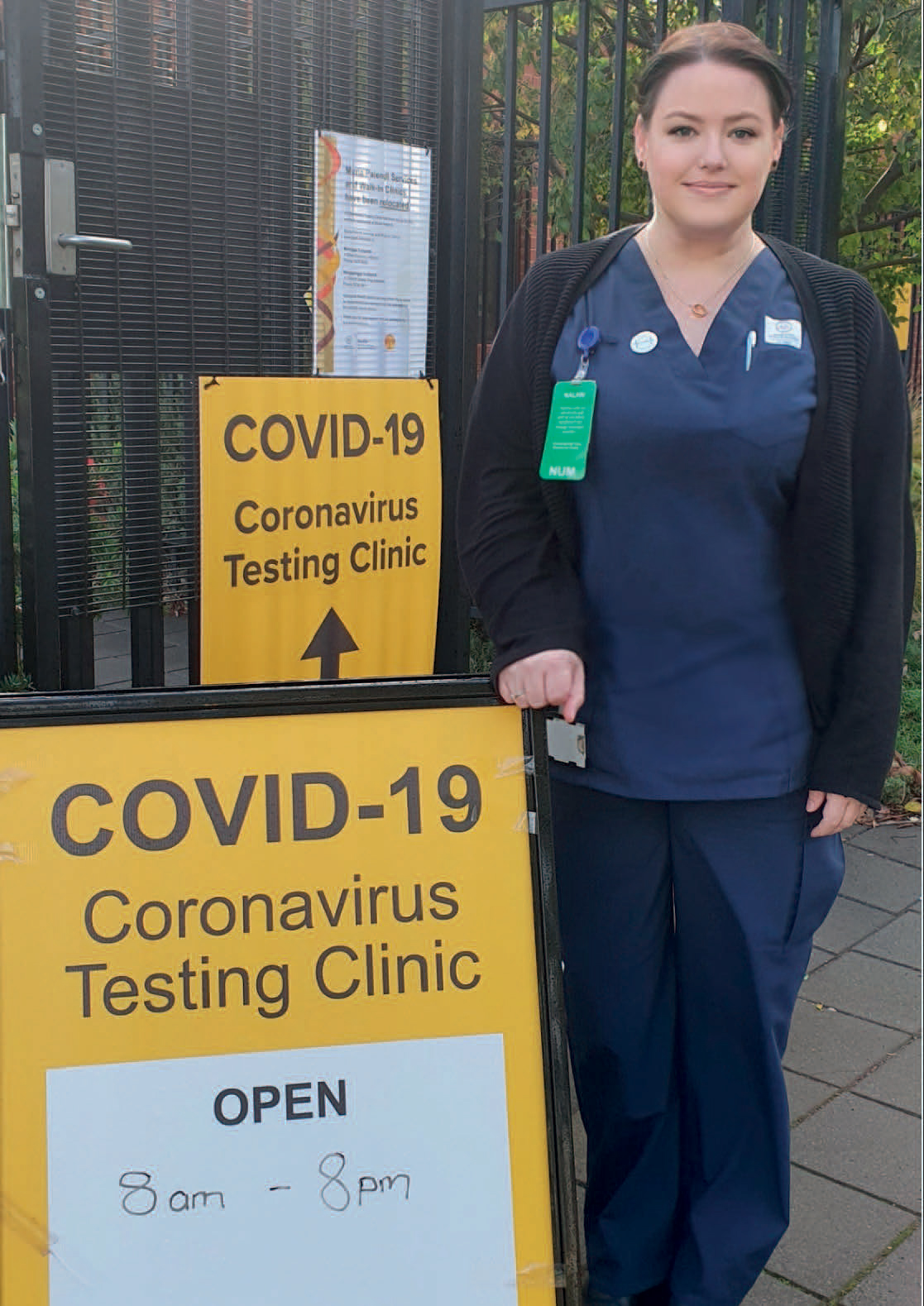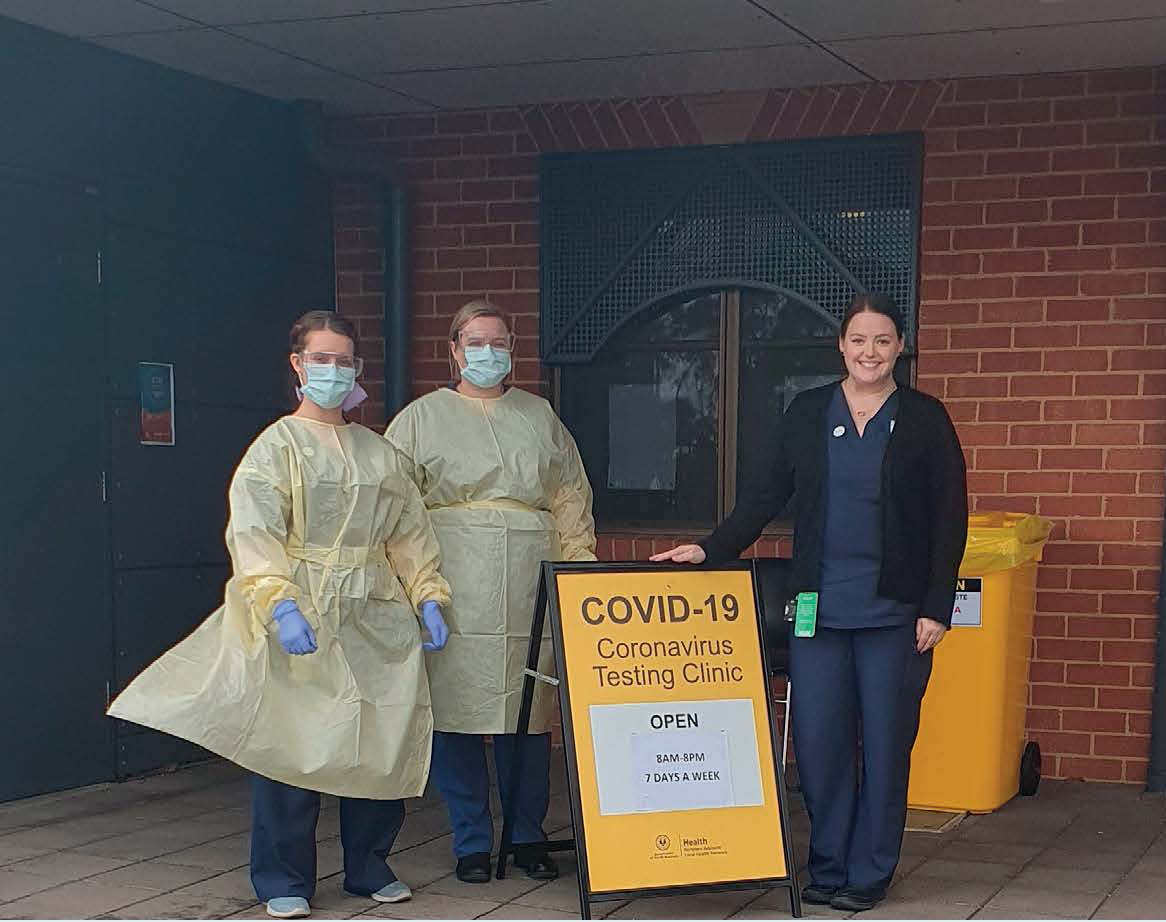15 July 2020
Article from July 2020 INPractice
Emergency department training was the key to success.

When the COVID-19 pandemic was just beginning to emerge in Australia, Kathaline Spalding jumped at the chance to lead her frontline charges at Lyell McEwin Hospital.
My background is ED, a Registered Nurse, I was just looking for an opportunity that was slightly out of the norm. I’ve done various studies in Infectious & Tropical Diseases and Humanitarian Aid, this was the first opportunity that presented to me to do something,’’ Ms Spalding said.
As Nursing Unit Manager at Lyell McEwin’s COVID-19 clinic, Ms Spalding has overseen the coronavirus testing of more than 5,000 people, 3,700 in April alone. She says she is unable to give a number for positive tests but “purely by analysis it’s been quite reduced compared to other networks’’.
Kathaline Spalding outside her COVID-19 testing clinic at Lyell McEwin Hospital
On a positive note, not one of Ms Spalding’s 35 to 40 COVID clinic staff have tested positive themselves – a credit to Kathaline and her team.
“It’s definitely a reflection on the work done with Infection Control and Staff Health and their methods of doing things as well,’’ she says.
“We (the clinic) are considered a low-risk area and that’s purely because we are aware of what’s coming in the door. We take measures to ensure that the public are protected as well before entering the clinic, and we use surgical masks, gowns, gloves and appropriate hand hygiene.
“Coming from a clinical care perspective, there was an element of preparedness; we went into disaster management mode (at the beginning).
We’re very fortunate here at NALHN (Northern Adelaide Local Health Network) to have an excellent Executive/Leadership team that had us quite prepared.
“We just implemented some of the strategies … and the clinic was created out of these plans and sub-plans. I don’t think there was an element of anxiety; I think we were fairly prepared for this. I certainly walked into something that was semifunctioning but that was easily adaptable to a fully functioning machine.’’
Unsurprisingly Ms Spalding’s family was not too thrilled to learn she had volunteered to throw herself at the COVID coalface from the outset.
“I’m a single mother of two young children so there was definitely an element of concern from my family,’’ she said.
“But once you just educate them on the work within the COVID clinic, I definitely feel safer working here where I know what’s coming through the doors compared to working at triage in the ED where you never know what’s coming in.
“We have had limited exposure to the positive cases but you get the odd one… their experience has been a great deal of isolation and that’s where we make sure that we can support them.
“We make sure that somebody’s aware of their mental health, make sure that they fully understand what it is that they’re up against and how they can look after themselves, and that’s the way we try and follow through the journey for that patient.’’

Aside from being the Nursing Unit Manager at the COVID Clinic, Ms Spalding is also an Associate Nursing Unit Manager at Lyell McEwin’s Emergency Department. It is fair to say she has come a long way in a very short time given her late arrival into the medical profession.
“I graduated, undergrad, in 2008. Before that I had a background in accounting and I worked with various law firms with the Industrial Relations Commission,’’ she says.
Kathaline Spalding outside her COVID-19 testing clinic at with her colleagues
“So, I was definitely not always a nurse. I came into it quite later after experiencing my father with cancer and I very, very quickly decided that ED nursing was where I wanted to be.
“I pursued that, worked my way up to a Clinical Nurse. I studied my undergrad at the University of South Australia; I did a Graduate Certificate in Critical Care Nursing through the QEH education system.
“I did a Graduate Diploma in Emergency Nursing through Adelaide University and then I did my Masters in Healthcare Leadership through Southern Cross University in Lismore, NSW.’’
Ms Spalding is the only nurse in her immediate family “but my identical twin sister is a health care assessor through the private system’’.
She says building patient therapeutic relationships is “definitely” the most rewarding aspect about nursing.
“I thrive on getting to know a family, just to know their story. For me understanding what they’re going through at the time, understanding it is possibly the scariest thing that they’ve experienced in their life and adapting that so you could treat them as you would want your family treated. So definitely, the patient experience is something that is very close to my heart.
“And just wanting to be in an acute environment where you never know what you are going to get, you never know what’s going to come through the doors, and wanting to be able to help and fix that problem. The only problem with emergency nursing is you don’t often get to see it through (once the patient leaves ED), you continue on with the next patient, you never get to know the outcome sometimes.’’
As for how her family was coping with lockdown?
“I’m just having to be a little bit creative in doing things with the kids,’’ Ms Spalding says.
“My kids are very creative anyway, so just doing the crafty things and finding fun things that are a little bit out of the norm for us. We’re doing a lot of muddy puddle walks and things like that. We used to go to the playground, we don’t do that anymore. Instead we’ll go for a bike ride or something a little bit different. It’s also about finding more indoor things to do.’’
At the time of writing South Australia had a relatively low number of recorded positive COVID-19 cases to date, which bodes well for the near future.
“At the end of the day we don’t know which direction this is going in yet,’’ Ms Spalding says. “I think the important thing is to make sure we’ve done as much as possible on the frontline and we have obviously because our numbers look amazing.
“But to continue that … and look at our avoidance strategies, and ways that we can continue the fight with COVID in conjunction with returning to business as usual.’’
Click
here to read the July 2020 edition of INPractice.